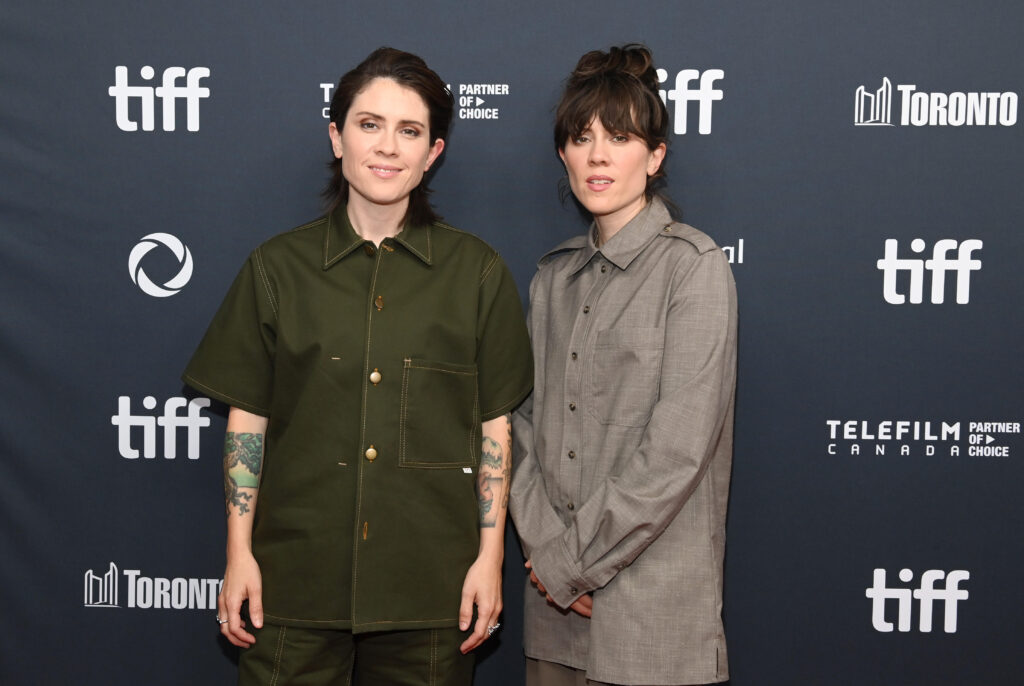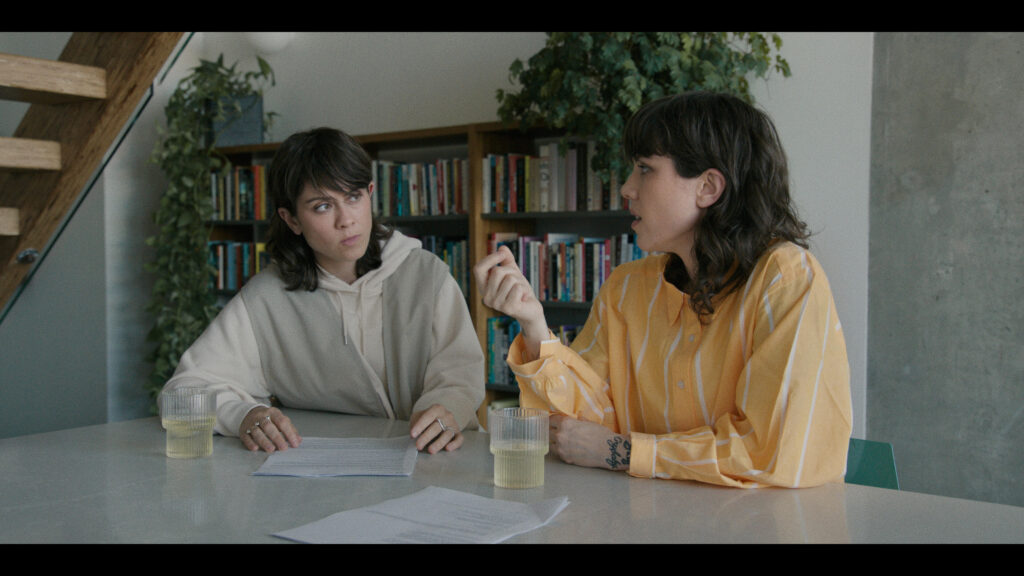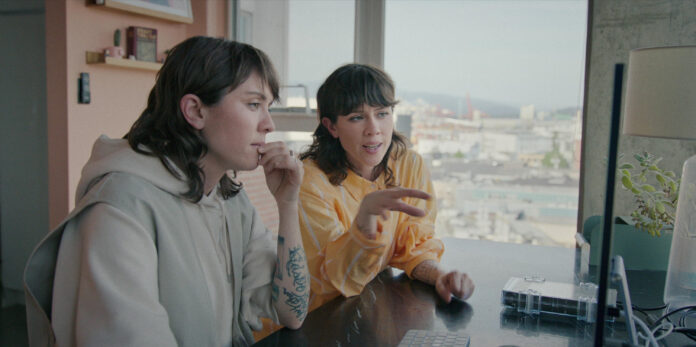The new Hulu documentary “Fanatical: The Catfishing of Tegan and Sara” makes some horror films look like Disney fare. That’s because something is especially scary when it could happen to you. Or in this case, a lesbian Canadian indie-turned-pop duo beloved by the LGBTQ+ community: Tegan and her twin sister Sara Quin. To chilling effect, the film chronicles a terrifying series of events that infiltrated their lives.
In the early stages of their rise in the 1990s, Tegan and Sara — known for their infectious indie-rock songs in the early 2000s — became iconic figures within the LGBTQ+ community, at a time when openly queer musicians were still a rarity. Their deep connection with queer fans was particularly strong, given the scarcity of such representation in music. Their mainstream breakthrough came with the release of “Heartthrob” in 2012, marking their shift to synth-pop and earning them millions of new fans, including Taylor Swift, with whom they later performed during her “Red” tour that same year.
But behind the scenes, the Quins were facing a disturbing betrayal. Tegan discovered in 2011 that someone with access to deeply personal details of their lives — details they hadn’t shared publicly, like their mother’s cancer diagnosis — was impersonating her and had been since 2008. This “fake Tegan,” the name they used within their inner circle to keep track of the imposter sister, befriended fans on social media, even engaging in romantic conversations, all while feeding them false information and ghosting on planned meetups. Things escalated further: their passports were leaked, private photos were made public, and the invasion of their privacy continued. Beyond the Quins, their closest friends, cyber security specialists, the FBI and numerous victims who were deceived by fake Tegan, no one knew the sisters were living through this real-life nightmare. “Just so frightening and overwhelming,” Tegan shares. “And I’m really good at dissociating from scary things.”
On a video call with Tegan, who I interviewed in 2013 while this was happening in the background, she admitted why they chose to stay silent about being catfished at the time. Primarily it was out of necessity for the safety of them and the numerous people — from fans to lovers — deeply affected by fake Tegan.
“We didn’t talk about it publicly, because it just seemed like it would be worse,” she says. “It would make it worse, it would draw too much attention. It might attract more predators.”
The other reason is simple, and once you watch the film, it becomes clear — it unfolds like a whodunit game of “Clue,” or as the documentary itself references, given the Myspace-era time frame in which some of this is happening, the 1995 cyber-thriller “The Net.” Except this wasn’t a movie.
“It’s not an easy story to sit down and tell,” Tegan explains. There were other difficult decisions they had to make, too, like figuring out who they could trust with sensitive details. What if they confided in the person who was actually the imposter, posing as Tegan? She adds, “I certainly couldn’t email about it, because I wasn’t 100% sure my emails weren’t being constantly hacked.”
Their catfishing ordeal is compelling in its own right, but director Erin Lee Carter frames this disturbing story within the larger context of how fame can amplify situations where fans feel entitled to the most intimate details of the artists they admire.
“It’s just so unnatural to be famous,” Tegan reflects, acknowledging that the artist-fan relationship should be centered on the music — yet stardom often complicates that dynamic, making it something far more invasive or even parasocialistic. Given this, can we really blame Chappell Roan for setting stricter boundaries with fans and photographers? “Fanatical” may just challenge your perspective on whether these boundaries are an act of ingratitude or simply a necessary part of doing the job of an artist who also happens to be a person.
“There were just expectations on artists,” she reflects. “There’s always been, and I think these days the younger artists are stepping up and going, ‘Actually, I don’t want to do this.’ I love how Mitski handled this record cycle. They virtually did no press.”
She says that Mitski, a fellow queer artist, is “an example of an artist who said, ‘The world’s my oyster, and everyone is listening to me and talking about me right now, and I’m not going to take every opportunity. I’m not.’ And I think some of these younger artists are prioritizing themselves and their health and their families over fame. A lot of queer artists and women, specifically, are speaking out right now, which is so inspiring and amazing.”

She adds that Roan is “just one artist basically saying, ‘Leave me alone.’ I mean, you think every famous person likes having to spend six or seven figures a year on security? Have their houses camped out at? They can’t go for dinner or to Disney World with their kids without people coming up and asking for selfies. We’re at a point in our culture where we have to ask ourselves if that’s OK. People will tell you, ‘Well, that’s your job, and you owe that to us.’ And I’m not interested in playing that game because I don’t feel that way. It’s absolutely not my job, and I’m absolutely not.”
Chalk it up to Tegan and Sara being 43 now — and also being inspired by a new generation of artists like Roan. “I don’t feel like I owe anyone anything except for what I choose to put out in the world, and you can take it or leave it, you know, so I don’t…,” she says, laughing. “I think we’re old.”
“We’re not those kinds of people where you can scour our social media,” she adds. “You don’t see us with our friends. You don’t see us with our family. You don’t see us with our partners. We keep the majority of ourselves private, but I think we do a really excellent job of still making you feel like you’re a part of what we’re building and the music and our story, but we’re very, very protective of our personal life now.”
Tegan recognizes how vastly different being a public figure would feel in the 1990s; for one major reason she’s grateful the duo did make waves before information was tweeted and dissected on Reddit. The sisters built relationships with their loyal queer following offline, through more direct, personal and physical methods, like in small clubs, in magazine interviews and during meet-and-greets.
“Culturally, everything has shifted so much in the last 20 years,” she says. “We’re so glad there was no Internet when we were teenagers,” she says, “because we would have absolutely filmed ourselves and put ourselves on the internet. It’s no judgment of people that are doing it. We would have done it. We filmed ourselves all the time, but we just played it for our friends.”
The violation of their privacy that would come later serves as a stark reminder of how drastically the internet can alter someone’s life. While stealing intimate details once required breaking into a filing cabinet by first breaking into someone’s house, now it only takes a few clicks.
The film asks, with urgency and abiding relevancy: What exactly is the “job” of a pop star? The follow-up question it seems to ask is just as important: Is that job different for queer pop stars? For queer artists in the pre-digital age of the 1990s, when social media did not provide a window into the lives of their favorite artists, fans of queer artists felt the need to understand the identities of those they admired. To love them was to know them, fully. Tegan and Sara became mirrors for fans, reflecting their own identities and experiences — a connection I can personally relate to. While many queer artists wouldn’t overtly label the pressure of this representation as a burden, and many express gratitude for offering visibility to those who need it, this responsibility often comes at the cost of privacy and the erosion of personal boundaries.
During their career ascension especially, Tegan acknowledges that she and Sara kept some healthy distance from fans, but their very presence as openly queer artists created a deep connection with many in the queer community. For many queer people, finding a queer-to-queer experience was rare, and this made their bond with Tegan and Sara even more significant.
“I definitely think we made a lot of space for queer people, for sure,” she says. “I think they were feeling very realized and seen by us, and we felt the same. I was looking out into an audience of people who looked like me, who lived the same lifestyle at times where we didn’t even have equal rights. There was a pretty epic energy exchange and love felt.”
The film takes you through a maze of potential suspects, including those closest to them and die-hard fans. But it also shifted course during the actual filming of it, the primary reason being “it’s a complicated portrait that we have of this person,” Tegan says. “I think this person was young and confused and has issues. It just felt time to move on.”
“By the end of production, I think we all had a really complicated understanding of everyone in the movie,” she adds. “I mean, many of the victims had also victimized me. Many of the victims were also deeply apologetic, and were like, ‘What was I doing on Tumblr, looking for your personal email?’”
Tegan describes “Fanatical” as “a bit of a time machine” that examines just how “commonplace and normalized” it has become to pry into the lives of public figures. Even as they were making the documentary, she says, “we just recognized that this film ended up being a human story about the internet and fame.”Although the film provided Tegan with “the closure I needed” regarding fake Tegan, new evidence has surfaced regarding that person’s identity. People have come forward with additional information, leading to breakthroughs.
“We had some pretty revelatory meetings with an FBI profiler and investigator with 25 years of experience,” she says. “They reviewed everything and created a fascinating map, which is why we think we know who the fake Tegan is.” According to the film, which Tegan again confirmed during our interview, all the physical evidence so far points to someone in the U.K.
With this saga mostly behind them, Tegan and Sara are considering their follow-up to 2022’s “Crybaby.” “We’re still going to make music,” Tegan assures. “We’re just going to do it on our own terms, like we always have.”

